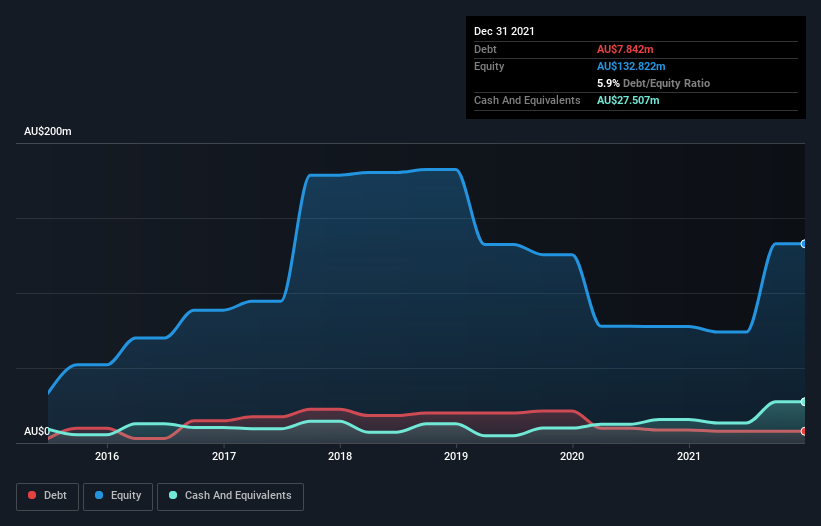Health Check: How Prudently Does Experience Co (ASX:EXP) Use Debt?
The external fund manager backed by Berkshire Hathaway's Charlie Munger, Li Lu, makes no bones about it when he says 'The biggest investment risk is not the volatility of prices, but whether you will suffer a permanent loss of capital.' It's only natural to consider a company's balance sheet when you examine how risky it is, since debt is often involved when a business collapses. We can see that Experience Co Limited (ASX:EXP) does use debt in its business. But the real question is whether this debt is making the company risky.
When Is Debt A Problem?
Debt assists a business until the business has trouble paying it off, either with new capital or with free cash flow. Part and parcel of capitalism is the process of 'creative destruction' where failed businesses are mercilessly liquidated by their bankers. While that is not too common, we often do see indebted companies permanently diluting shareholders because lenders force them to raise capital at a distressed price. Having said that, the most common situation is where a company manages its debt reasonably well - and to its own advantage. When we examine debt levels, we first consider both cash and debt levels, together.
See our latest analysis for Experience Co
What Is Experience Co's Debt?
The image below, which you can click on for greater detail, shows that Experience Co had debt of AU$7.84m at the end of December 2021, a reduction from AU$8.66m over a year. But it also has AU$27.5m in cash to offset that, meaning it has AU$19.7m net cash.
A Look At Experience Co's Liabilities
The latest balance sheet data shows that Experience Co had liabilities of AU$34.1m due within a year, and liabilities of AU$30.7m falling due after that. Offsetting these obligations, it had cash of AU$27.5m as well as receivables valued at AU$2.12m due within 12 months. So its liabilities outweigh the sum of its cash and (near-term) receivables by AU$35.1m.
Of course, Experience Co has a market capitalization of AU$248.3m, so these liabilities are probably manageable. However, we do think it is worth keeping an eye on its balance sheet strength, as it may change over time. Despite its noteworthy liabilities, Experience Co boasts net cash, so it's fair to say it does not have a heavy debt load! The balance sheet is clearly the area to focus on when you are analysing debt. But it is future earnings, more than anything, that will determine Experience Co's ability to maintain a healthy balance sheet going forward. So if you're focused on the future you can check out this free report showing analyst profit forecasts.
In the last year Experience Co had a loss before interest and tax, and actually shrunk its revenue by 8.0%, to AU$44m. That's not what we would hope to see.
So How Risky Is Experience Co?
We have no doubt that loss making companies are, in general, riskier than profitable ones. And we do note that Experience Co had an earnings before interest and tax (EBIT) loss, over the last year. And over the same period it saw negative free cash outflow of AU$8.9m and booked a AU$8.2m accounting loss. With only AU$19.7m on the balance sheet, it would appear that its going to need to raise capital again soon. Overall, we'd say the stock is a bit risky, and we're usually very cautious until we see positive free cash flow. The balance sheet is clearly the area to focus on when you are analysing debt. However, not all investment risk resides within the balance sheet - far from it. Be aware that Experience Co is showing 1 warning sign in our investment analysis , you should know about...
If, after all that, you're more interested in a fast growing company with a rock-solid balance sheet, then check out our list of net cash growth stocks without delay.
Have feedback on this article? Concerned about the content? Get in touch with us directly. Alternatively, email editorial-team (at) simplywallst.com.
This article by Simply Wall St is general in nature. We provide commentary based on historical data and analyst forecasts only using an unbiased methodology and our articles are not intended to be financial advice. It does not constitute a recommendation to buy or sell any stock, and does not take account of your objectives, or your financial situation. We aim to bring you long-term focused analysis driven by fundamental data. Note that our analysis may not factor in the latest price-sensitive company announcements or qualitative material. Simply Wall St has no position in any stocks mentioned.

 Yahoo Finance
Yahoo Finance 
